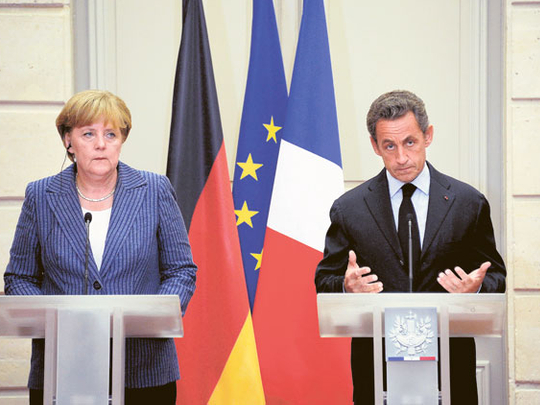
Dubai: Dire economic growth in the Eurozone is a threat to trade, investment and expansion in the Gulf region, local economists and market analysts warned on Tuesday.
According to new data, the 17-nation bloc grew by just 0.2 per cent on a quarterly basis with analysts expressing particular concern over sluggish GDP growth in Germany, which had been driving Europe's economic recovery.
"The problems in the Eurozone will have an effect on the GCC because we are heavily connected to Europe as a trade and investment partner. If Europe does not address these issues we could be on the verge of a crisis that would put [the collapse of] Lehmann Brothers in the shadows," said Nasser Saidi, chief economist at Dubai International Financial Centre.
"The Eurozone crisis is a great matter of concern for Gulf-based private investors, as well as local sovereign wealth funds, because the GCC countries are net exporters of capital and they are at risk of sustaining substantial losses across their portfolios," he added.
Gulf investors, already reeling from last week's turmoil on global equity markets following the United States' credit downgrade, are now digesting the latest bleak figures from the Eurozone as the prospect of a double-dip recession continues to grow more likely.
"The common factor in both the US and the Euro-zone is the potential for a full-blown sovereign debt crisis. We have moved away from the initial crisis in the private sector, where governments and central banks took over non-performing assets and, in many countries, effectively formed a nationalised banking system; the debt scenario has moved from a personal liability to an aggregated national liability," Saidi said. "It is a matter of trust and risk aversion is rising rapidly across debt and equity markets. If we enter a full-blown debt crisis, it is unclear who is going to be doing the rescuing," he added.
The disappointing GDP figures took their toll on European equity markets with London's FTSE 100, Frankfurt's DAX and Paris' CAC 40 Index all posting losses at 6pm UAE time. Local bourses followed negative global sentiment with Dubai's benchmark index and Abu Dhabi's exchange both closing down.
"Germany's disappointing GDP numbers have renewed fears of a potential slowdown in economic recovery and most global markets saw a sell-off across the board yesterday," said Marwan Shurrab, vice-president and chief trader at Gulfmena Investments.
"Commodity prices dropped and US futures were also down; such movements affect local market performance. There has been a high correlation between our markets and global news events over the last few months and local investors will continue to anticipate guidance from international markets for the foreseeable future," he added.
Gold prices also rose yesterday ahead of a key meeting between German Chancellor Angela Merkel and French President Nicolas Sarkozy.
"Interbank spreads in the Eurozone are running at elevated levels and investors are worried about their exposure [to the bloc]. If we have a confidence crisis in Europe, it will have an impact on the global economy as well as have a direct link on oil prices," said Giyas Gokkent, group chief economist at the National Bank of Abu Dhabi.
"For now, oil prices are at comfortable levels for the region but we are seeing real jitters in local financial markets, which are still weak and investors are on the edge," he added.












